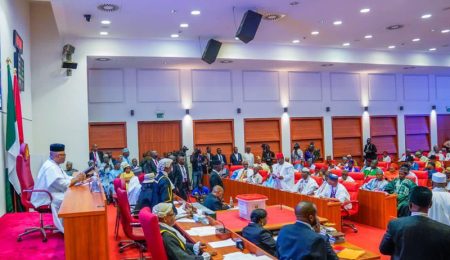Professor Akpan Ekpo, an economist, has emphasised that government borrowing should focus on projects that stimulate economic growth, while insisting on transparency and exploring alternative financing options beyond traditional external loans.
Speaking on ARISE NEWS on Wednesday, Ekpo explained the intergenerational impact of borrowing, saying, “What we are borrowing today, for whatever reason, it is our children, great-grandchildren and so on that will pay the debts. And when they come and see that there is nothing on the ground, what we are borrowing from, it will be very disturbing. In fact, I used to argue that they might even abuse us when we are in our graves.”
He highlighted alternatives to external borrowing, explaining, “There are alternative sources of financing infrastructure. For example, PPP—public private partnership—where government and private sector co-fund projects. Alternatively, contractor financing, where the contractor finances the project and gets paid later. Or tax waivers, allowing big companies to embark on projects instead of paying tax. You can also do build-operate-hold or build-operate-transfer. There are experts in these areas in government. So, there are other sources, not just external borrowing.”
Ekpo noted that borrowing is not inherently problematic if it is directed at productive infrastructure projects. “Now with the rebased GDP, the denominator is higher than the numerator and there is room for borrowing. But what do you borrow? Definitely, you can borrow to finance infrastructure that will pay its way and bring returns at the end of it. But that means that you have to do a lot of serious feasibility studies as to what projects should be financed,” he said.
On the justification of current government borrowing, Ekpo remarked, “Well, I’ve not seen, and I may not have all the information, the projects that deserve such extensive borrowing for now. But let me say this: if they are borrowing to fund, for example, a power project, and they are transparent enough, that will be a bridge up with them. That will grow the economy, generate jobs, and lead to a resilient economy.”
He stressed the importance of transparency, adding, “So borrowing is not an issue, but you have to be transparent when you are borrowing. You have to let people know why you are borrowing and the processes and the sources you are borrowing from.”
On ensuring projects deliver economic value, he said, “You have to do a serious, rigorous feasibility study before you put a project forward. So the cost-benefit analysis is very, very crucial. I’m not aware that it is always done. That’s why when I say transparent, there’s nothing wrong in letting citizens know that you’ve done a cost-benefit analysis on this project, and that it’s beneficial for the economy. I would urge civil society to put pressure on government to show the cost-benefit analysis on each project. We have agencies of government that should do that, and they have experts. If they don’t, they can engage consultants. There’s nothing wrong in putting that in the public space for people to look at and see whether it makes sense to borrow and invest in those projects.”
Faridah Abdulkadiri
Follow us on:
